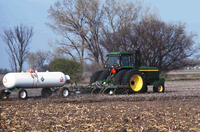
Pesticides: Do you have to Train? How to Tell
Does your facility have:
- Pesticide workers or handlers on farms, nurseries, greenhouses, and forests?
- Workers and other persons who may have accidental exposure to pesticides?
If you answered no, you are off the hook and don’t have to train workers under the Pesticide Worker Protection Standard (WPS). But, if you answered yes, you’re going to have to do some training. Here’s what your training, at a minimum, MUST include.
Training for the Trainer
Pesticide trainers should:
- Be certified as an applicator of restricted use pesticides under 40 CFR 171; or
- Be designated as a trainer of certified applicators or handlers by a state, federal, or tribal agency having jurisdiction; or
- Have completed a pesticide safety train the trainer program approved by a state, federal, or tribal agency having jurisdiction.
Deliver fast and effective Environmental, DOT, and OSHA training with Environmental Training Library. Try it at no cost or risk. For a limited time, also receive a free special report. Download Your Free Report
Training for the Worker
- Possible pesticide locations (on/in plants, soil, irrigation water, or wind from nearby application)
- Routes through which pesticides enter the body
- Methods to prevent pesticide entering the body (personal protective clothing and equipment, washing/showering, etc.)
- Hazards from toxicity or exposure (acute, chronic, and delayed effects, and sensitization)
- Signs and symptoms of pesticide poisoning
- Emergency first aid for pesticide poisonings and injuries
- How to obtain emergency medical care
- Routine and emergency decontamination
- Hazards from chemigation and drift
- Hazards from pesticide residue on clothing
- Warnings about taking pesticides or containers home
- A worker must possess an EPA approved WPS worker training certificate
- Refresher training every 5 years
- Other requirements designed to reduce risks of illness or injury resulting from workers’ exposure to pesticides, including application and entry restrictions, warning sign design and posting, oral warnings, availability of application information, and protection against retaliation
Download your FREE special report, Hazwaste Container Management: Where EPA Inspectors Look First, and receive a 30-day trial of Environmental Training Library at no cost or obligation. Download Your Free Report
Training for the Handler
- Format and meaning of pesticide labels
- Pesticide hazards from toxicity or exposure (acute, chronic, delayed effects and sensitization)
- Routes through which pesticides enter the body
- Signs and symptoms of pesticide poisoning
- Emergency first aid for pesticide poisonings and injuries
- How to obtain emergency medical care
- Routine and emergency decontamination
- Need for and use of personal protective equipment
- Prevention, recognition, and first aid treatment of heat related illness
- Handling, transporting, storing , and disposing of pesticides, including spill cleanup
- Environmental concerns (drift, runoff, and wildlife hazards)
- Warnings about taking pesticides or pesticide containers home
- Employer requirements, including prohibition against application that could contact workers or others, personal protective equipment use, training and decontamination, and protection against retaliation
- Refresher training every 5 years
A Powerful Training Resource
Training: it’s hard work, and it can take so much time! Let BLR’s environmental experts do the work for you with Environmental Training Library. This extensive library of prewritten training materials helps you deliver EPA, RCRA, and HAZWOPER required training with ease.
In the start package along, you’ll have 120 training tools for your first 20 sessions. This includes PowerPoint® training meetings with audio, interactive classroom exercises, handouts, quizzes, and more! And with your regular supplements, (included at no additional cost) you’ll get 2 new PowerPoints each quarter to keep your training current!
Take a Free Trial today, and for a limited time, also download our Free Special Report, Hazwaste Container Management: Where EPA Inspectors Look First.
